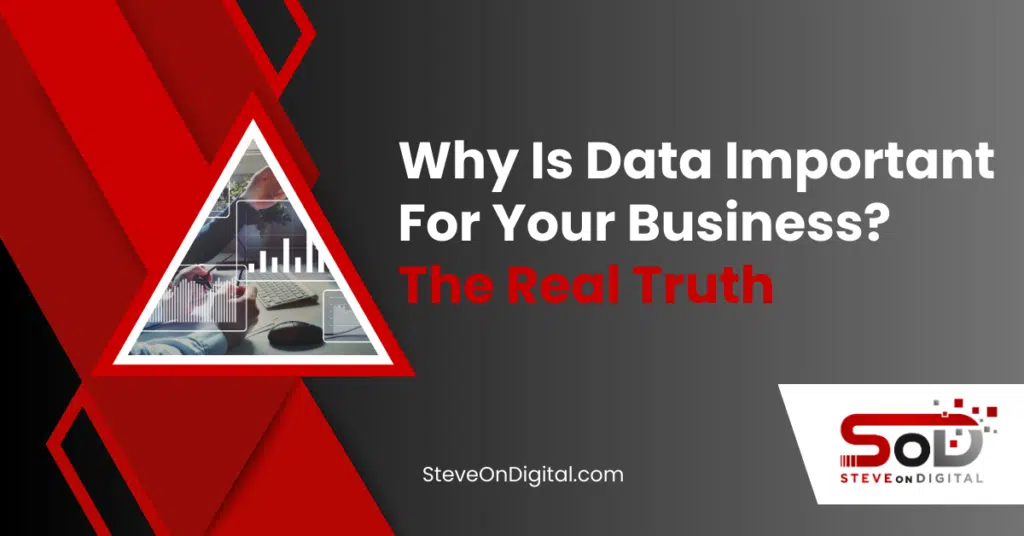Why Is Data Important For Your Business? | The Real Truth

Hello, I’m Steve Johnston from SteveOnDigital, and today we’re diving into why data is foundational for any business looking to thrive in today’s fast-paced market. Across industries, data has transitioned from a nice-to-have to an absolutely essential asset. It drives strategic decisions, refines business processes, and directly impacts the bottom line. Through my journey as a Digital Transformation Specialist, I’ve witnessed first-hand how the power of good data transforms SMEs. Here’s a closer look at why data is so pivotal. Data not only provides a clear understanding of where your business stands but also unveils pathways to where it could go. It’s about collecting data, both internal data and external data, and analyzing it to better understand your market conditions, consumer behavior, and operational efficiency. In this post, I’ll share insights on how leveraging data can grant your business a competitive edge, make your operations more efficient, and help you make informed decisions that drive growth. Unpacking The Value Of Customer Data Customer data is gold in the digital economy. Every interaction your customers have with your business, from browsing your website to completing a transaction, generates valuable data. By analyzing customer information, such as demographic details, purchasing habits, and social media activity, businesses can gain actionable insights. For instance, in my experience working with SMEs, I’ve helped businesses tailor marketing efforts by harnessing marketing data and customer feedback to create personalized customer experiences. This not only boosts customer retention but also increases revenue. One particular case involved a small retailer who, by leveraging customer data through predictive analytics, was able to optimize their stock levels and manage inventory more effectively, significantly reducing costs. Moreover, the strategic planning of marketing campaigns becomes more targeted with access to rich customer data. For example, understanding customer preferences helps tailor advertising retargeting, which in turn enhances the effectiveness of marketing dollars spent. This approach not only cuts costs but also increases the efficiency of marketing efforts, ensuring that every penny counts. Data Analysis Data analysis acts as the backbone for strategic decision-making in any business. With the right tools and techniques, raw data is transformed into insights that can guide key business decisions and strategies. In my role, I often guide businesses in setting up systems to analyze data effectively, ensuring that they can respond swiftly to changing market conditions and consumer needs. Tools like business intelligence software and data analytics platforms play a crucial role here. They allow businesses to process large volumes of data—big data—to unearth patterns and trends that are not visible to the human eye. This kind of analysis leads to better informed decisions, enhances business performance, and can even help in developing new business models. For example, through data driven insights gathered from sales and customer interactions, a business can refine its product performance and make smarter decisions about which new services to launch. In one instance, by analyzing sales data and customer feedback, a business I worked with could adjust its product offerings to better meet the needs of its consumers, significantly boosting sales and customer satisfaction. Optimizing Business Operations Through Data-Driven Processes In my years guiding SMEs through digital transformations, I’ve seen firsthand how data-driven processes are pivotal for streamlining operations and enhancing productivity. Here’s how businesses can utilize data analytics to not only boost efficiency but also substantially cut costs. Let me share a personal example. In one of the projects, by implementing a data-driven approach to manage inventory, we helped a client reduce overstock and avoid stockouts. This optimization led to a 20% reduction in inventory costs, showcasing how analyzing data can lead directly to significant financial savings. Risk Management And Security The role of data in risk management cannot be overstated. Data helps business owners anticipate potential risks and implement strategies to mitigate them effectively. Here’s how data fortifies a business’s defenses: From my experience, a clear understanding of risk management through data has enabled companies I’ve worked with to not just survive but thrive amid uncertainties. By analyzing historical data and market conditions, we’ve developed strategies that shield businesses from potential financial and operational risks. Competitive Advantage Through Strategic Data Use In today’s rapidly changing business environment, maintaining a competitive edge is more challenging and crucial than ever. Here’s how businesses leverage both internal data and external data to stay ahead of the competition: Leveraging Big Data And Predictive Analytics For Future Planning In the realm of digital transformation, big data and predictive analytics have become essential tools for businesses looking to stay ahead. As a Digital Transformation Specialist, I’ve seen these tools in action, helping businesses forecast market trends and anticipate customer needs with remarkable accuracy. Here’s how leveraging these technologies can enhance your strategic planning and decision-making processes. From personal experience, utilizing big data and predictive analytics in strategic planning has enabled the companies I’ve advised to not only mitigate risks but also discover lucrative opportunities for growth. For example, a retail client used predictive models to forecast seasonal fluctuations and adjust their inventory and marketing strategies accordingly, which significantly boosted their sales and customer satisfaction. Benefit Description Improved Demand Forecasting Predictive models analyze historical sales data to accurately forecast future demand and manage inventory. Enhanced Customer Insights Analyzing customer behavior patterns helps predict future buying habits and preferences. Risk Reduction Identifies potential risks in business operations and market trends, allowing for preemptive actions. Operational Efficiency Optimizes business operations by predicting peak operation times and resource requirements. Marketing And Sales The impact of data on marketing and sales strategies cannot be overstated. In today’s data-driven world, the ability to analyze customer information and marketing data has transformed how businesses approach sales and marketing. Here’s how data-driven insights are making a significant impact: An example from my consultancy practice involved assisting a client in enhancing their online advertising retargeting strategy through detailed analysis of consumer behavior and purchase history. The result was a 30% increase in conversion rates, demonstrating the power of informed, data-driven decision making in marketing and sales.

